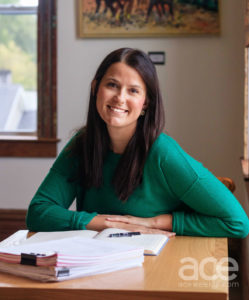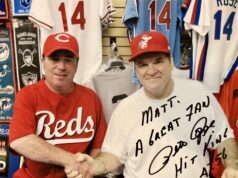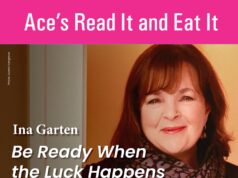Poison Pill
By Kristina Rosen
Vitale Buford is relaxing at Martine’s Pastries at the exact table where she sat and wrote her book, Addicted to Perfect, four months ago. No one who runs into her would guess that she survived a 10-year love affair with Adderall.
But that’s the truth about addiction. You never really know who is struggling with it, and you can never really know what someone is using, or has used, to numb their pain.
“When people think of recovery, they think of drugs and alcohol, but as humans we are all using something to numb the pain,” says Buford. “Whether it’s television, relationships, food, gambling; all of us have something we use to cope with the things happening in our lives.”

Buford’s upcoming memoir details her real and raw journey through an addiction to Adderall and ultimately perfection, and how she finally broke free.
She was introduced to Adderall as a “study drug” during her junior year of college. She lost 20 pounds and received the best grades of her life with her hardest course load yet. She loved the weight loss and the newfound effortless ability to accomplish projects. By her senior year, she was able to obtain her own prescription. She sensed it was going to become a problem, but found it irresistible.
For the next ten years, she successfully hid her addiction from everyone. She got her first job in public relations, and recalls, “because of my work ethic and my ability to work 24 hours a day, I got promoted.” In her marketing role for a prominent law firm, she quickly rose through the ranks to become a department director at the age of 25.
 At the height of her addiction, she was taking 360mg a day, while the recommended daily allowance is 50mg. No one had any idea she was a slave to this drug or the lengths she was going to obtain it — from doctor shopping, which is illegal, to the brink of going to jail.
At the height of her addiction, she was taking 360mg a day, while the recommended daily allowance is 50mg. No one had any idea she was a slave to this drug or the lengths she was going to obtain it — from doctor shopping, which is illegal, to the brink of going to jail.
More than a New York Times best-selling author, and more than a survivor of addiction, Buford now describes herself as a transformational coach, speaker, eating disorder survivor, podcast host, mother, and Kentucky native. None of which are in chronological order.
As a coach and speaker, she’s a pro at giving advice, but the best piece of advice she has ever been given is actually what got her sober and changed her life.
In May 2014, someone told her, “I see in you what I refuse to see in myself.” Buford didn’t think much of it until the following week when her mom relapsed along her path to alcohol sobriety.
She remembers being infuriated with her mother. “I was so upset and angry. I looked at her like ‘why can’t you just get sober?’ Then I took a step back and I remembered that quote. I realized in that moment that I saw in my mom what I refused to see in myself, which was that I was struggling with addiction and I was the one unwilling to get sober. I was pointing my finger at her when I should’ve been pointing the finger at myself.”
“I look at fear as a compass now. If it’s scary and uncomfortable, I am going to do it anyway.”
Several weeks later, on June 7, 2014, Buford made the decision to get sober and check herself into rehab.
She knew something had to change, but Adderall had been her crutch for ten years, and by that point, it had become part of her identity. “I had to grieve that,” she remembers.

If she could go back and tell college-student-Vitale one thing, she says, “I would remind her that she is so lovable as she is. [She’s] more than her body and her weight and she doesn’t have to have everything figured out right now.”
But even if she could, Buford wouldn’t change her past. She believes those experiences and obstacles have led her in the direction to tell her story and in her line of work to help others heal.
After she got sober five years ago, Vitale knew she had to write a book. She started writing this past June and it took her four weeks to finish.
As she wrote, she discovered that her need for perfection was the underlying issue that ultimately led to her Adderall addiction.
Buford grew up in a home where alcoholism and workaholism reigned. Perfection was how she was going to find love and praise. She turned to everything outside of herself to feel valued, seen, and heard.
“Perfectionists don’t allow life to be an experiment,” she says. “It’s black or white, and we don’t give ourselves room to err. The life you want is on the other side of your fear. I look at fear as a compass now. If it’s scary and uncomfortable, I am going to do it anyway.”

September was National Recovery Month and Buford spent it sharing her story, not only to warn of the dangers of Adderall addiction, but to remind us, “the more we walk toward pain instead of hide from it, then the more we heal, and the more life opens up. We think to avoid pain is freedom but really to confront our pain and sit in it is freedom.”
“You don’t have to have an Adderall addiction to read this book,” she says. “It’s a message of hope, and I hope it inspires [readers] to be vulnerable in their own lives and tell their own story.”
“The more vulnerable you are,” she says, “the more your life opens up. People want to be seen and heard, they want to have real conversation and connection. Vulnerability actually gives you connection.”
EDIT: Addicted to Perfect is available here
__
This article also appears on page 9 of the October 2019 print edition of Ace Weekly.
Subscribe to the Ace e-dition for Lexington news, arts, culture, food, and entertainment news delivered to your inbox.
Call today to advertise in Ace, 859.225.4889








